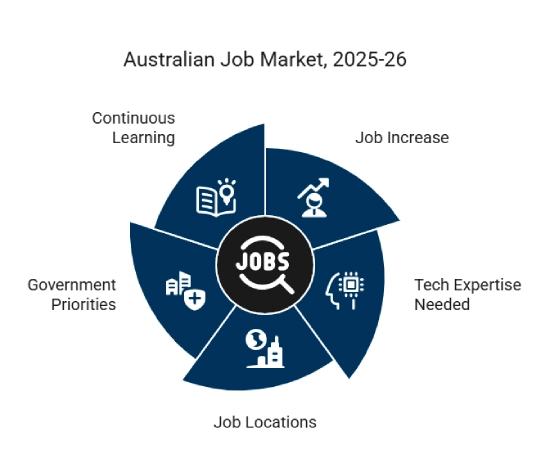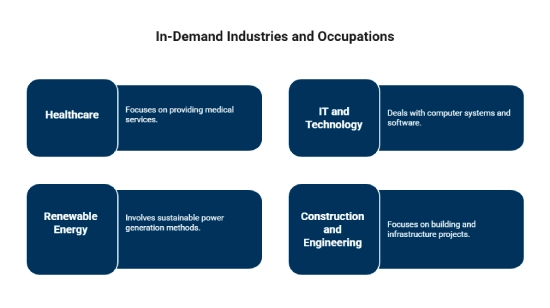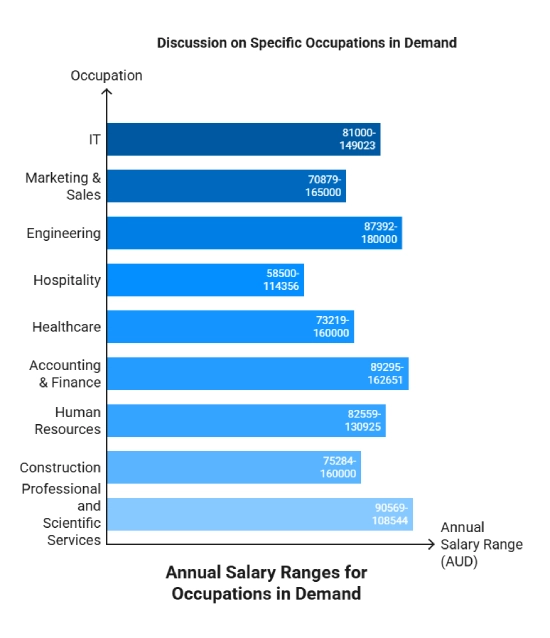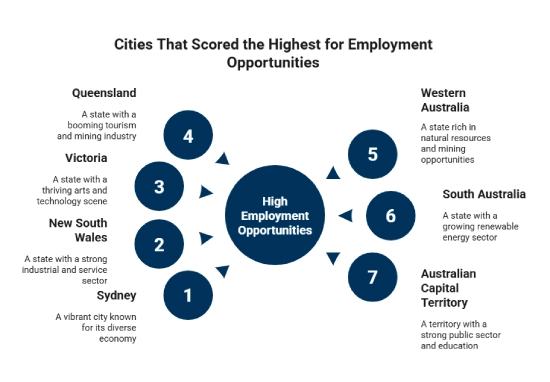Australian Job Market, 2025-26
In 2025-26, Australia's job market looks good, with healthcare, tech, and building leading the way. As the economy bounces back and changes to meet new demands, people searching for work should see chances in different fields. Technology, robots, and how we work will change the job market. Here’s a quick look at what to expect for jobs in Australia in 2025-26:2%
- Job Increase: Australia should see a 2% increase in jobs during 2025-26
- Tech Expertise Needed: AI, data science, and cybersecurity pros are in high demand
- Where the Jobs Are: Sydney, Melbourne, and Brisbane are the places to look for work
- Government Priorities: More jobs in healthcare and renewable energy are a top goal
- Keep Learning: To stay ahead, job seekers should keep their skills fresh

Job Outlook in Australia
The job market in Australia should be doing well between 2025 and 2026. We're expecting more jobs to open up, mostly in healthcare, tech, and renewable energy. If you're looking for a job, there should be plenty of chances for skilled people, especially in IT, engineering, healthcare, and finance. The government is also putting money into new buildings, green projects, and tech upgrades, which should lead to even more jobs.
Understanding the Job Outlook for Job Seekers and Employers
Australia's job market is changing because of the growing digital economy. People looking for jobs should see chances in growing fields like tech, health, and green energy. Government programs set up to create jobs and teach skills will be key in building the workforce. This means people with the right skills and those who can adapt should be sought after. Though, there will be more competition, mostly in big cities such as Sydney and Melbourne. So, people need to get ready and present their skills well.
General Employment Trends for the Year
In 2025, Australia’s employment market is expected to expand, particularly in high-tech industries, healthcare, and construction sectors. As the population ages, healthcare and aged care jobs will be in high demand. The rise in technological adoption across industries will increase demand for roles in IT, cybersecurity, software development, and AI. Moreover, the infrastructure boom fueled by government investment in renewable energy and urban development projects will create jobs in engineering, project management, and construction. Remote work will also continue to rise in sectors such as IT, marketing, and customer service, providing more flexibility for job seekers across Australia.
Factors Influencing Job Creation or Reduction
A number of things will shape job growth and losses in Australia. Tech improvements, especially in automation, AI, and digital tools, will help create jobs in some areas but wipe them out in others. For example, because more industries are going digital, we’ll need more data analysts, cybersecurity pros, and software engineers. But, automation could cut down on manual labor jobs in manufacturing, retail, and shipping. Also, government plans and economic help, focusing on green energy and building projects, will lead to jobs in renewable energy and construction. How the global economy changes and Australia’s trade deals will also impact job trends. Areas like farming and tourism will grow at different rates based on what the world wants.
In-Demand Industries and Occupations
Australia's job market is set to expand in the IT, healthcare, engineering, and construction fields. Tech jobs, mainly for AI specialists, software developers, and data scientists, will be greatly needed. Healthcare will require more doctors, nurses, and aged care staff. As Australia puts money into infrastructure, civil and mechanical engineers should have numerous job prospects. These industries should keep expanding through 2026.
Analysis of Industries Experiencing Growth and Increased Demand for Skilled Workers
In 2025-26, a number of industries in Australia are expected to grow, which means more jobs for skilled people.
- Healthcare: Because the population is aging and there's more need for medical care, the healthcare field will keep expanding. There will be a greater need for healthcare staff, such as nurses, doctors, physical therapists, and elder care workers, all over the country.
- IT and Technology: The tech sector is still one of Australia's quickest-growing areas. As companies quickly adopt digital changes, the need for IT experts, especially in fields like cybersecurity, software creation, data analysis, and AI, will keep going up. Because businesses want to protect private data, data security will be very important.
- Renewable Energy: Australia's dedication to being sustainable and lowering carbon emissions will cause the renewable energy sector to grow a lot. This includes jobs in solar and wind power, electrical engineers, energy advisors, and project leaders who work on green technologies.
- Construction and Engineering: There will be a high need for skilled tradespeople and engineers because of big investments in infrastructure, especially in city growth and renewable energy projects. Civil engineers, designers, and construction workers are crucial to meeting the country's goals for growth and urbanization.

These industries will need a range of skilled workers, with a strong focus on technology and green energy. It help support Australia's changing financial situation.
*Looking to work in Australia? Get top consultation from experts at Y-Axis.
Discussion on Specific Occupations in Demand
As Australia continues its economic transformation, certain occupations will see significant growth in 2025-26.
|
Occupation |
Annual salary in AUD |
|
IT |
$81,000 – $149,023 |
|
Marketing & Sales |
$70,879 – $165,000 |
|
Engineering |
$87,392 – $180,000 |
|
Hospitality |
$58,500 – $114,356 |
|
Healthcare |
$73,219 – $160,000 |
|
Accounting & Finance |
$89,295 – $162,651 |
|
Human Resources |
$82,559 – $130,925 |
|
Construction |
$75,284 – $160,000 |
|
Professional and Scientific Services |
$90,569 – $108,544 |

*Willing to migrate to Australia? Y-Axis will help you with the step-by-step process.
Workforce Demands in Different States of Australia
The job situation in Australia differs from state to state, and some regions have more jobs because of the local industries. Sydney and Melbourne should continue to be the important places to find work, especially for those in tech, finance, and healthcare. Brisbane and Perth will probably grow in construction, engineering, and renewable energy because of the infrastructure projects planned. The rural areas, especially those involved in farming, healthcare, and mining, will also have jobs, but they are looking for particular skills.
Examination of Job Market Differences across States
In 2025-26, the Australian job market will experience diverse trends across different states, driven by sector-specific growth and regional demands. Here's a breakdown of what to expect:
- New South Wales (NSW): Sydney will continue to lead job growth with over 300,000 job openings expected in sectors like finance, IT, and healthcare. Software developers, financial analysts, and healthcare professionals will be in high demand as the city expands its role as a global business and tech hub.
- Victoria (VIC): Melbourne will see strong growth, especially in tech and engineering, with over 220,000 jobs expected to be created. Jobs in AI, data analytics, and construction will rise significantly due to the city's development projects and focus on green technologies. Healthcare roles, particularly for aged care specialists, will also see demand.
- Queensland (QLD): Queensland, led by Brisbane, will see about 150,000 job openings in construction, renewable energy, and healthcare. There will be a rising need for skilled engineers, project managers, and healthcare professionals, especially with the large-scale infrastructure projects taking place. The state's renewable energy sector will grow by 20% by 2026.
- Western Australia (WA): Perth’s economy will continue to be driven by mining and energy. With over 100,000 job openings in the sector, roles for engineers, geologists, and tradespeople will remain highly sought after. Additionally, the state’s focus on clean energy will create new job opportunities in solar and wind power.
- South Australia (SA): South Australia’s economy will be boosted by defense and aerospace sectors. Around 60,000 jobs are expected in defense manufacturing, particularly in Adelaide, while renewable energy projects will add jobs in green tech fields. Engineers and skilled trades will see increased demand.
- Tasmania (TAS): Tasmania’s job market will grow, with an increase in agricultural and tourism-related roles. Around 25,000 job openings are projected in agriculture and tourism by 2025, as well as a rise in renewable energy positions due to state investment in wind and solar.
- Australian Capital Territory (ACT): Canberra will continue to be the epicenter of public sector jobs, with over 40,000 government positions expected to be available. The ACT will also see growth in IT and communications, with roles for software developers and cybersecurity experts becoming more prominent.
- Northern Territory (NT): The Northern Territory will experience job growth in public services, healthcare, and tourism. Over 10,000 job openings will be created in these sectors, with a particular focus on the public administration, healthcare professionals, and tourism sector.
Cities That Scored the Highest for Employment Opportunities
- Sydney
- New South Wales (NSW)
- Victoria (VIC)
- Queensland (QLD)
- Western Australia (WA)
- South Australia (SA)
- Australian Capital Territory (ACT)

*Looking to study in Australia? Talk to Y-Axis, the world’s no. 1 overseas immigration company.
Highlighting areas with notable job opportunities or challenges
In 2025-26, several Australian cities are expected to experience significant job growth due to their thriving economies, industry hubs, and investment in key sectors. Here's a breakdown of the cities that are expected to provide the most job opportunities:
- Sydney, New South Wales: Sydney remains the powerhouse of Australia’s job market, with over 300,000 job openings expected across multiple industries. As the financial and technology hub, it leads in sectors like finance, IT, healthcare, and construction. However, the high cost of living and competition for roles in top industries might pose challenges for newcomers.
- Melbourne, Victoria: Melbourne is projected to offer over 220,000 new job openings, primarily in tech, construction, and healthcare. The city's focus on digital transformation, green technologies, and infrastructure development means high demand for software developers, engineers, and healthcare professionals. However, housing affordability might be a concern for workers relocating.
- Brisbane, Queensland: Brisbane will see approximately 150,000 job openings with a sharp rise in construction, renewable energy, and healthcare sectors. The state's emphasis on infrastructure projects and clean energy will contribute to this growth. Challenges in Brisbane include the potential for skills shortages in technical fields and higher competition for jobs in certain sectors.
- Perth, Western Australia: Perth will remain a hub for mining, energy, and defense sectors, with over 100,000 job openings projected. The demand for engineers, project managers, and skilled tradespeople will continue to rise, especially in renewable energy. However, the challenge in Perth lies in the reliance on mining, which can be susceptible to global commodity price fluctuations.
- Adelaide, South Australia: Adelaide’s economy will be bolstered by its defense and aerospace sectors, with 60,000 new jobs expected, especially in manufacturing and construction. South Australia is also investing heavily in clean energy, creating opportunities for professionals in green technologies. However, Adelaide may face challenges in attracting skilled labor from outside the state due to its smaller job market.
- Canberra, Australian Capital Territory: The government sector in Canberra will continue to thrive, with over 40,000 new positions projected. Roles in public administration, policy development, and information technology will remain in high demand. A challenge for Canberra is the smaller job market and the high level of competition for government roles.
- Hobart, Tasmania: While Hobart has a smaller job market, it is expected to see growth in agriculture, tourism, and renewable energy sectors, with 25,000 new job openings. The state’s push for solar and wind energy will create opportunities, but the challenge lies in attracting skilled professionals to a regional area with limited infrastructure and housing availability.
Impact of Technology and Automation in Australia
In Australia, tech and automation are quickly changing the job scene as we head into 2025 and beyond. Industries are starting to use new tech like AI, robotics, and machine learning, which is causing big changes in some areas. The job market now needs digital skills more than ever. There's a high demand for jobs in IT, data science, software development, cybersecurity, and AI. At the same time, automation is taking over many repetitive, manual jobs, especially in manufacturing, transportation, and office work.
Discussion on how technological advancements and automation are shaping the job market:
- Tech Industry Expansion: As businesses automate, the need for tech experts to run these systems grows. Software developers, AI experts, data analysts, and cybersecurity pros will still find many jobs in Australia.
- Renewable Energy Jobs: Automation in fields like renewable energy has led to new jobs in solar, wind, and other green technologies. Engineers and technicians who know sustainable tech will be in demand.
- Healthcare Improvements: Automation in healthcare—especially telemedicine and robotic surgery—has made jobs for healthcare tech experts and medical staff who can use these improvements.
Potential opportunities and challenges for workers in the evolving landscape
As we look ahead to 2024 and beyond, the employment outlook in Australia promises both opportunities and challenges. It's a landscape where employer branding, skills shortages, and cost consciousness converge with a renewed focus on future-proofing organisations.
It's a call for job seekers to support control, curiosity, and continuous learning. For business leaders, it's an invitation to lead with flexibility, innovation and diversity.
Skills in Demand in Australia
The Australian job market is expected to keep changing by 2025, which means we will see an increased need for technical and soft skills. As industries depend more on technology, people with these skills will be valued.
Identification of key skills sought by employers
Understanding the skills employers seek is essential when creating resumes and interviewing for jobs. Certain soft skills are highly valued in particular industries. They show you can collaborate, adjust, and contribute to a team.
Importance of up skilling or reskilling for job seekers
Improving and refining skills can boost earning potential and open doors to career advancement. By improving and refining skills, people can stay competitive and increase their chances of success in a fast-changing world.
Remote Work and Flexible Arrangements
Exploring the Continued Rise of Remote Work
Remote work has become quite popular lately because it is good for both companies and workers. The COVID-19 pandemic pushed many companies to try remote work, and the trend has stuck around. Remote work offers people more flexibility, saves companies money, and helps people balance their work and personal lives better, which can make them happier and more productive. Because of this, remote jobs will likely be common, especially in fields such as tech, marketing, and customer service.
Implications for Both Employers and Employees
To ensure remote work is successful, it's vital that both employers and employees set up clear expectations. Employers must give workers key info like job duties, pay, work hours, vacation days, and how the work will be done. Clear talk on these things makes a structured remote work setting that helps everyone. It's also vital that companies give resources like remote tools, tech, and training, to keep their remote teams productive and healthy.
Government Policies and Initiatives
Overview of Any Government Programs or Policies Influencing Employment
The Australian government has put in place some rules to help create jobs and support people who work. For example, the JobMaker Hiring Credit encourages businesses to hire younger people. Also, the Workforce Australia program gives people training and services to help them find work, which are key to job growth. The government is also concentrating on green energy with the National Hydrogen Strategy and putting money into renewable energy jobs. This will cause growth in areas like solar and wind power. The government gives businesses reasons to create jobs in regional areas, which lowers joblessness and helps the economy all over Australia.
Analysis of How Policy Changes May Impact the Job Market
Policy changes can really change the job market, either by helping some industries grow or by making things harder for others. For example, putting more money into teaching digital skills and building new projects should lead to more jobs in tech, construction, and renewable energy. On the other hand, if immigration policies change, it could be tougher to find skilled workers, especially in fields that depend on people from other countries. The government's work to support remote work and flexible schedules will also play a big role in where people work. It could make it simpler for people in rural areas or those with family care duties to find jobs in big industries like IT, marketing, and finance.
Challenges and Opportunities for Job Seekers in Australia
In Australia, those looking for work may find it tough due to strong competition in popular fields and the need to constantly update their skills. Still, new chances are opening up in areas like health, tech, and renewable energy, so being able to adapt to change will be a plus.
Discussion on the Challenges Faced by Job Seekers
Job searching can be challenging, but by recognizing common obstacles, job seekers can approach the process with more confidence and a clearer strategy.
Common Challenges Faced by Job Seekers:
- Old Resumes: It's very important to keep resumes updated with our most recent skills and jobs. But sometimes we forget to do this.
- Hard Applications: Some bosses use long and confusing application forms. It can be a lot.
- Confusing Job Info: When job descriptions are not clear, it can be hard for people to know what the job really is.
- Long Interviews: Interview processes can take a lot of time and have too many steps, which can frustrate job seekers.
- No Salary Info: Not knowing how much a job pays makes it hard for people to know if it's worth it.
- Resume Scanners: A lot of places use tools to scan resumes. These tools can miss good people if their resumes aren't just right.
- Secret Jobs: Some jobs are not advertised. People have to talk to others and use people they know to find them.
- Feeling Not Good Enough: People looking for jobs might think they need to meet every single requirement. This can hold them back from applying.
Tips and Strategies for Navigating the Job Market Successfully
Those looking for work should improve their skills in growing areas like tech and renewable energy. Meeting people, going to job fairs, and using sites like LinkedIn can assist in meeting possible employers. Keeping up with government programs that aid job creation and skills training will give candidates an edge.
Summary of Australia Job Outlook
The Australian job market is expected to grow in 2025-26, especially in IT, healthcare, and renewable energy. People with special skills should have a lot of chances to find work. Remote work and training programs supported by the government will help create even more jobs. To do well in Australia's changing job market, people should keep learning and stay informed about what's new.
*Searching for Jobs in Australia? Find the right one with the help of Y-Axis job search services.
Looking for Inspiration
Explore what Global Citizens have to say about Y-Axis in shaping their future
Frequently Asked Questions
